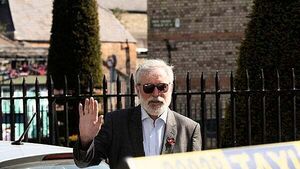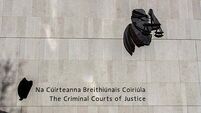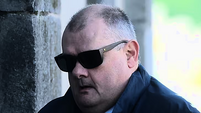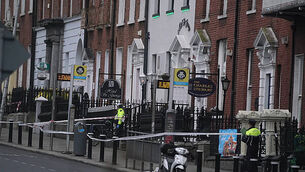Source who told BBC Gerry Adams sanctioned murder would 'likely be killed if identified', court told

High Court Reporters
A source who claimed to a BBC Spotlight programme that Gerry Adams sanctioned the Provisional IRA’s murder of a British agent would likely be killed if he was identified, the journalist behind the documentary has said.
Jennifer O’Leary also told the High Court on Tuesday that at least two additional sources disclosed to her that the Provisional IRA were behind the murder of MI5 agent Denis Donaldson, and not dissident republicans.
She is currently giving evidence on the third week of a civil trial hearing into the former Sinn Féin leader’s defamation action against the BBC.
Mr Adams claims a Spotlight programme and a related article published in 2016 defamed him by falsely accusing him of sanctioning the 2006 killing of Mr Donaldson.
The BBC denies it defamed Mr Adams, who insists he had no involvement in Mr Donaldson’s death, which dissident republicans claimed responsibility for in 2009.
Explaining the genesis of the Spotlight programme to BBC counsel Eoin McCullough, Ms O’Leary said she met a “well placed” republican source in late 2015 who said the Provisional IRA were responsible for the murder of Mr Donaldson, and not dissident republicans.
She said the source said the IRA had let dissidents claim Mr Donaldson’s death.
She said that a security source she subsequently met repeated the claim that the IRA was behind Mr Donaldson’s death.
Ms O’Leary said she first met “Martin”, the anonymous source who claimed Mr Adams sanctioned the murder of Mr Donaldon in the BBC programme.
On a number of occasions, Ms O’Leary said she was constrained in the details she could share about “Martin”. “It is rare to have a source where if his identity is revealed, it is likely he will be killed,” she said.
Ms O’Leary denied suggestions that she had “animus” towards Mr Adams. “I didn’t have an agenda against Gerry Adams,” she said.
Opening the BBC’s defence to Mr Adams’ action, Eoin McCullough SC told the jury there was three basic points to its case.
He said there was a “fundamental dispute” in the case about the meaning of the Spotlight broadcast and article.
Mr McCullough said the BBC say the Spotlight programme and article do not mean that Mr Adams sanctioned and approved the murder of Mr Donaldson.
He said the BBC reported that “Martin” had made the allegation to that effect, but made it clear that it was an allegation only. The broadcast made it clear that Mr Adams said the allegation was “nonsense”, Mr McCullough said.
“It can’t mean that the BBC is saying Mr Adams sanctioned and approved the murder,” he said.
Mr Mc Cullough said the same goes for the related article.
He added that if they determine that broadcast means only that there is reasonable grounds to suspect that Mr Adams sanctioned the murder, his case must fail.
Secondly, Mr McCullough said, whatever the proper meaning, and whether its contents are right or wrong, the Spotlight programme and article was a “proper piece of investigative journalism”, and as such, the BBC was entitled to rely on the defence of fair and reasonable publication in the public interest.
He outlined how the Defamation Act 2009 offers certain protections to free speech and journalism. He said that a journalist is entitled to publish material in the public interest as they do so in good faith and act fair and reasonably.
He said the jury would hear that “Martin” gave Ms O’Leary information that would have been “irresponsible” to ignore.
He said the jury would hear that the allegations in the programme were thoroughly investigated, and the allegations in the broadcast were based on multiple sources – “not just the allegations about Mr Adams”. He denied what he said was Mr Adams’ side’s assertion that the broadcast and article was based on one anonymous source.
Thirdly, Mr McCullough said, if the jury do agree with what Mr Adams says the programme means, they should not award him damages because of the reputation he has. Mr McCullough said Mr Adams has a reputation for having been in the IRA, for having sat on its army council, and on that account, having presided over a campaign of violence in which many people were killed.
Mr McCullough said there was “overwhelming” evidence before the jury regarding Mr Adams’ reputation.
He recalled documentary clips, newspaper articles and books that reported the views of senior IRA members regarding Mr Adams’ involvement in the paramilitary organisation. He told the jury they’d heard former taoisigh speak to the same subject.
Mr McCullough said Mr Adams himself accepted in his evidence that he had a reputation for being in the IRA, sitting on its army council, and organising violence when he acknowledged that allegations and assertions to the end were “out there” for a very long time.
“That’s not at issue ... that is his reputation,” Mr McCullough said.
He said the allegation that Mr Adams sat on the IRA’s army council was made in the Spotlight programme at the centre of the proceedings – but claimed that Mr Adams’ didn’t sue over this claim because he knows that is his reputation.
He said his assertion that he had a reputation as a “peacemaker” was “just incomprehensible”. He asked the jury how Mr Adams could acknowledge the allegations that he was in the IRA and directed a campaign of violence, and at the same time say that his reputation was one of a “peacemaker”.
Earlier, John Kerr BL, for told that the Spotlight programme was viewed by an average of 15,800 people in the State.
The jury also viewed a montage of clips taken from news reports and television programme, compiled by Mr Adams’ lawyer.
The montage included segments from RTÉ’s Reeling In The Years, a BBC archive clip of Mr Adams’ 1995 meeting with Nelson Mandela, an ITN clip of Mr Adams’ meeting Bill Clinton on the Falls Road in 1995, and Sky News clip showing Mr Adams’ shaking hands with the then-Prince Charles in Galway in 2015.
Prior to showing the segment, Mr Justice Owens said they were entitled to consider the montage because it comprises material in the public domain.
He said Mr Adams’ reputation may be like the “curate’s egg” – “good in parts, bad in parts” – and that the material was an example of “good publicity” for Mr Adams.




